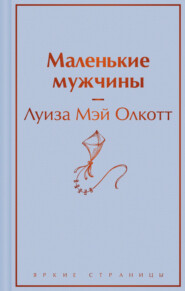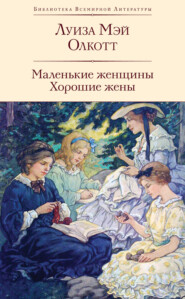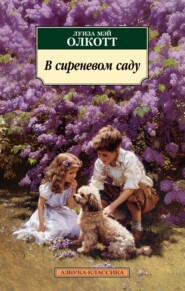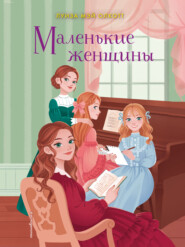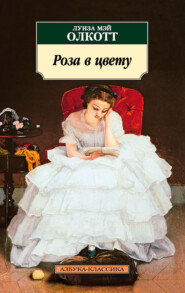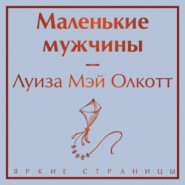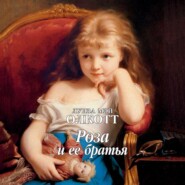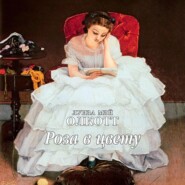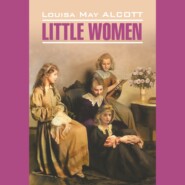По всем вопросам обращайтесь на: info@litportal.ru
(©) 2003-2024.
✖
Little Women. Good Wives
Настройки чтения
Размер шрифта
Высота строк
Поля
Mrs. March broke the silence that followed Jo's words, by saying in her cheery voice, “Do you remember how you used to play Pilgrims Progress when you were little things? Nothing delighted you more than to have me tie my piece bags on your backs for burdens, give you hats and sticks and rolls of paper, and let you travel through the house from the cellar, which was the City of Destruction, up, up, to the housetop, where you had all the lovely things you could collect to make a Celestial City.”
“What fun it was, especially going by the lions, fighting Apollyon, and passing through the Valley where the hobgoblins were,” said Jo.
“I liked the place where the bundles fell off and tumbled downstairs,” said Meg.
“My favorite part was when we came out on the flat roof where our flowers and arbors and pretty things were, and all stood and sung for joy up there in the sunshine,” said Beth, smiling, as if that pleasant moment had come back to her.
“I don't remember much about it, except that I was afraid of the cellar and the dark entry, and always liked the cake and milk we had up at the top. If I wasn't too old for such things, I'd rather like to play it over again,” said Amy, who began to talk of renouncing childish things at the mature age of twelve.
“We never are too old for this, my dear, because it is a play we are playing all the time in one way or another. Our burdens are here, our road is before us, and the longing for goodness and happiness is the guide that leads us through many troubles and mistakes to the peace which is a true Celestial City. Now, my little pilgrims, suppose you begin again, not in play, but in earnest, and see how far on you can get before father comes home.”
“Really, mother? Where are our bundles?” asked Amy, who was a very literal young lady.
“Each of you told what your burden was just now, except Beth; I rather think she hasn't got any,” said her mother.
“Yes, I have; mine is dishes and dusters, and envying girls with nice pianos, and being afraid of people.”
Beth's bundle was such a funny one that everybody wanted to laugh; but nobody did, for it would have hurt her feelings very much.
“Let us do it,” said Meg thoughtfully. “It is only another name for trying to be good, and the story may help us; for though we do want to be good, it's hard work, and we forget, and don't do our best.”
“We were in the Slough of Despond tonight, and mother came and pulled us out as Help did in the book. We ought to have our roll of directions, like Christian. What shall we do about that?” asked Jo, delighted with the fancy which lent a little romance to the very dull task of doing her duty.
“Look under your pillows, Christmas morning, and you will find your guidebook,” replied Mrs. March.
They talked over the new plan while old Hannah cleared the table, then out came the four little workbaskets, and the needles flew as the girls made sheets for Aunt March. It was uninteresting sewing, but tonight no one grumbled. They adopted Jo's plan of dividing the long seams into four parts, and calling the quarters Europe, Asia, Africa, and America, and in that way got on capitally, especially when they talked about the different countries as they stitched their way through them.
At nine they stopped work, and sang, as usual, before they went to bed. No one but Beth could get much music out of the old piano; but she had a way of softly touching the yellow keys, and making a pleasant accompaniment to the simple songs they sang. Meg had a voice like a flute, and she and her mother led the little choir. Amy chirped like a cricket, and Jo wandered through the airs at her own sweet will, always coming out at the wrong place with a croak or a quaver that spoiled the most pensive tune. They had always done this from the time they could lisp.
“Crinkle, crinkle”,
'ittle 'tar, and it had become a household custom, for the mother was a born singer. The first sound in the morning was her voice, as she went about the house singing like a lark; and the last sound at night was the same cheery sound, for the girls never grew too old for that familiar lullaby.
Chapter two
A MERRY CHRISTMAS
Jo was the first to wake in the gray dawn of Christmas morning. No stockings hung at the fireplace, and for a moment she felt as much disappointed as she did long ago, when her little sock fell down because it was crammed so full of goodies. Then she remembered her mother's promise and, slipping her hand under her pillow, drew out a little crimson-covered book. She knew it very well, for it was that beautiful old story of the best life ever lived, and Jo felt that it was a true guidebook for any pilgrim going on a long journey. She woke Meg with a “Merry Christmas,” and bade her see what was under her pillow. A green-covered book appeared, with the same picture inside, and a few words written by their mother, which made their one present very precious in their eyes. Presently Beth and Amy woke, to rummage and find their little books also – one dove-colored, the other blue; and all sat looking at and talking about them, while the east grew rosy with the coming day.
In spite of her small vanities, Margaret had a sweet and pious nature, which unconsciously influenced her sisters, especially Jo, who loved her very tenderly, and obeyed her because her advice was so gently given.
“Girls,” said Meg seriously, looking from the tumbled head beside her to the two little night-capped ones in the room beyond, “mother wants us to read and love and mind these books, and we must begin at once. We used to be faithful about it; but since father went away and all this war trouble unsettled us, we have neglected many things. You can do as you please; but I shall keep my book on the table here, and read a little every morning as soon as I wake, for I know it will do me good, and help me through the day.”
Then she opened her new book and began to read. Jo put her arm round her and, leaning cheek to cheek, read also, with the quiet expression so seldom seen on her restless face.
“How good Meg is! Come, Amy, let's do as they do. I'll help you with the hard words, and they'll explain things if we don't understand,” whispered Beth, very much impressed by the pretty books and her sisters' example.
“I'm glad mine is blue,” said Amy; and then the rooms were very still while the pages were softly turned, and the winter sunshine crept in to touch the bright heads and serious faces with a Christmas greeting.
“Where is mother?” asked Meg, as she and Jo ran down to thank her for their gifts, half an hour later.
“Goodness only knows. Some poor creeter came a-beggin', and your ma went straight off to see what was needed. There never was such a woman for givin' away vittles and drink, clothes and firin',” replied Hannah, who had lived with the family since Meg was born, and was considered by them all more as a friend than a servant.
“She will be back soon, I think; so fry your cakes, and have everything ready,” said Meg, looking over the presents which were collected in a basket and kept under the sofa, ready to be produced at the proper time. “Why, where is Amy's bottle of cologne?” she added, as the little flask did not appear.
“She took it out a minute ago, and went off with it to put a ribbon on it, or some such notion,” replied Jo, dancing about the room to take the first stiffness off the new army slippers.
“How nice my handkerchiefs look, don't they? Hannah washed and ironed them for me, and I marked them all myself,” said Beth, looking proudly at the somewhat uneven letters which had cost her such labor.
“Bless the child! she's gone and put 'Mother' on them instead of 'M. March'. How funny!” cried Jo, taking one up.
“Isn't that right? I thought it was better to do it so, because Meg's initials are M.M., and I don't want anyone to use these but Marmee,” said Beth, looking troubled.
“It's all right, dear, and a very pretty idea – quite sensible, too, for no one can ever mistake now. It will please her very much, I know,” said Meg, with a frown for Jo and a smile for Beth.
“There's mother. Hide the basket, quick!” cried Jo, as a door slammed, and steps sounded in the hall.
Amy came in hastily, and looked rather abashed when she saw her sisters all waiting for her.
“Where have you been, and what are you hiding behind you?” asked Meg, surprised to see, by her hood and cloak, that lazy Amy had been out so early.
“Don't laugh at me, Jo! I didn't mean anyone should know till the time came. I only meant to change the little bottle for a big one, and I gave all my money to get it, and I'm truly trying not to be selfish any more.”
As she spoke, Amy showed the handsome flask which replaced the cheap one; and looked so earnest and humble in her little effort to forget herself that Meg hugged her on the spot, and Jo pronounced her “a trump”, while Beth ran to the window, and picked her finest rose to ornament the stately bottle.
“You see I felt ashamed of my present, after reading and talking about being good this morning, so I ran round the corner and changed it the minute I was up: and I'm so glad, for mine is the handsomest now.”
Another bang of the street door sent the basket under the sofa, and the girls to the table, eager for breakfast.
“Merry Christmas, Marmee! Many of them! Thank you for our books, we read some, and mean to every day,” they all cried, in chorus.
“Merry Christmas, little daughters! I'm glad you began at once, and hope you will keep on. But I want to say one word before we sit down. Not far away from here lies a poor woman with a little newborn baby. Six children are huddled into one bed to keep from freezing, for they have no fire. There is nothing to eat over there; and the oldest boy came to tell me they were suffering hunger and cold. My girls, will you give them your breakfast as a Christmas present?”
They were all unusually hungry, having waited nearly an hour, and for a minute no one spoke; only a minute, for Jo exclaimed impetuously,
“I'm so glad you came before we began!”
“May I go and help carry the things to the poor little children?” asked Beth eagerly.
“I shall take the cream and the muffings,” added Amy, heroically giving up the articles she most liked.
Meg was already covering the buckwheats, and piling the bread into one big plate.
“I thought you'd do it,” said Mrs. March, smiling as if satisfied. “You shall all go and help me, and when we come back we will have bread and milk for breakfast, and make it up at dinnertime.”
They were soon ready, and the procession set out. Fortunately it was early, and they went through back streets, so few people saw them, and no one laughed at the queer party.
A poor, bare, miserable room it was, with broken windows, no fire, ragged bedclothes, a sick mother, wailing baby, and a group of pale, hungry children cuddled under one old quilt, trying to keep warm.






